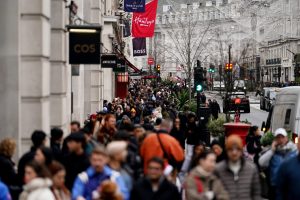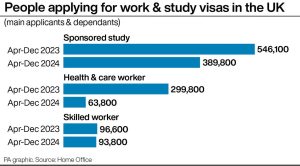
The United Kingdom has witnessed a dramatic decline in visa applications following the implementation of stricter immigration policies aimed at reducing legal migration levels. Provisional Home Office figures reveal a staggering 42% drop in applications between April and December 2024, with the number of applications plummeting from 942,500 in the same period of 2023 to a mere 547,000.
This significant decrease has been primarily attributed to a sharp decline in applications from overseas students and foreign care workers, two sectors heavily impacted by the new restrictions. The number of sponsored study visas, for instance, has fallen by 29%, down from 546,000 in the previous year to 389,800. Similarly, applications for health and care worker visas have plummeted by a staggering 79%.

Key Factors Contributing to the Decline:
- Restrictions on Dependants: One of the most significant deterrents has been the imposition of restrictions on family dependants for certain visa categories. This has particularly affected international students and care workers, many of whom rely on bringing their families to the UK.
- Increased Salary Thresholds: The government has raised the minimum salary threshold for skilled worker visas, making it more difficult for individuals to qualify.
- Stringent Spousal Visa Regulations: The tightening of spousal visa regulations has also contributed to the decline in applications.
Impact on Various Sectors:
- Education: The decline in student visas has raised concerns among universities, which rely heavily on international student fees.
- Healthcare: The shortage of healthcare workers in the UK has been exacerbated by the significant drop in applications for health and care worker visas.
- Economy: The overall impact on the UK economy remains to be seen, but the decline in skilled migration could potentially hinder economic growth and innovation.
Criticism and Concerns:
Critics argue that the government’s restrictive immigration policies are counterproductive, deterring skilled workers and students from coming to the UK and harming key sectors of the economy. Concerns have also been raised about the potential impact on social cohesion and cultural diversity.
Government Response:
The government maintains that the stricter immigration policies are necessary to control population growth and ensure that the UK’s infrastructure can cope with increased demand. They argue that the focus should be on attracting highly skilled individuals who can contribute significantly to the UK economy.
The significant drop in visa applications to the UK underscores the far-reaching impact of the government’s stricter immigration policies. While the government aims to control migration levels, the decline in applications from key sectors raises concerns about potential economic and social consequences. The long-term implications of these policies remain to be seen, but the data clearly indicates a significant shift in immigration trends to the UK.

